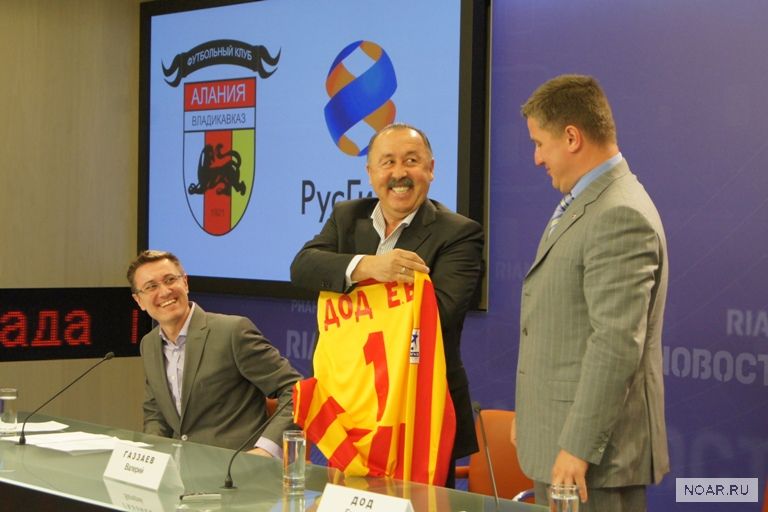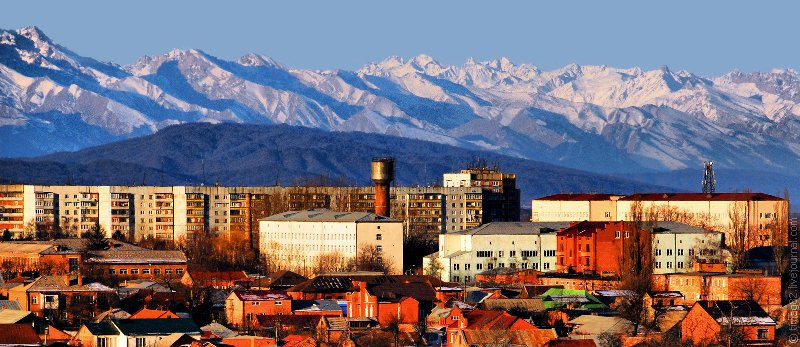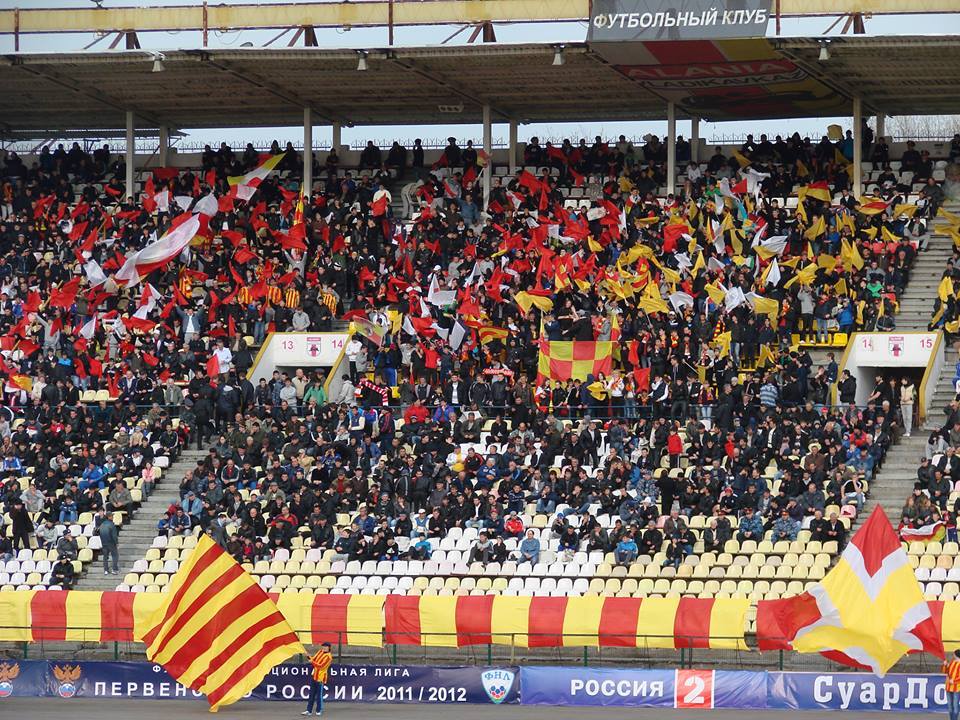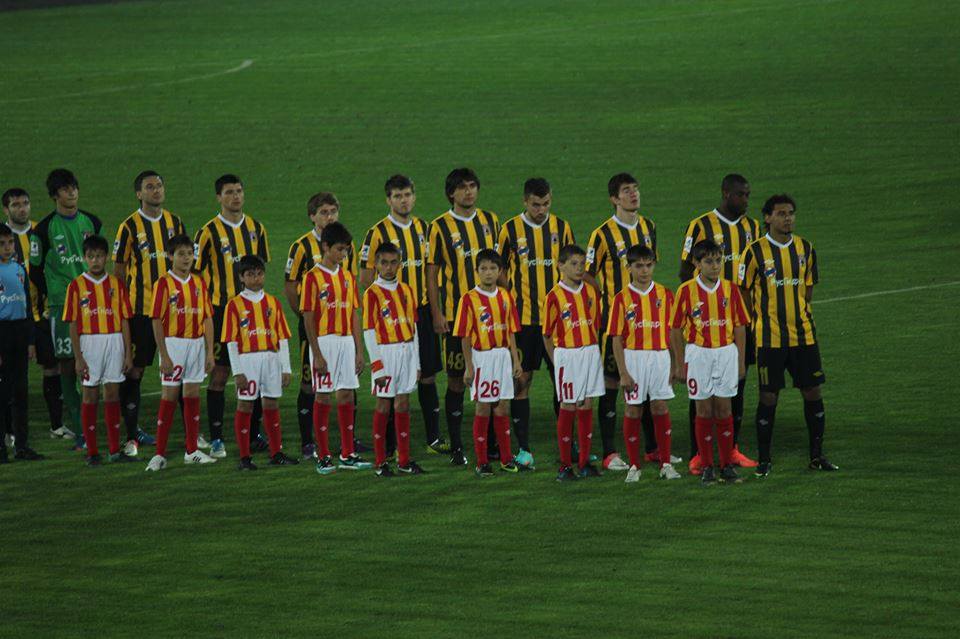By David McArdle –
On Monday 18 November 2013, former Russian champions Alania Vladikavkaz announced that they were unable to finance the team’s forthcoming expedition to Russia’s Far East for their Russian National Football League (FNL) match against Vladivostok’s Luch-Energiya.
In the significant foreground, meanwhile, a trend is emerging in Russia – and perhaps even more so in Ukraine – whereby less fashionable clubs are slowly, yet precariously, being wound up; the solution in Russia being the arrival of an eleventh hour governmental-induced sponsor in the form of an ostensibly generous oligarch. (For greater analysis of the situation in Ukraine, see Futbolgrad’s Arsenal Kyiv Rest in Peace).
Alania Vladikavkaz, therefore, represent a ‘tipping point’ for many having gained notoriety as the first club outside Moscow to have won the Russian league, whilst boasting one of Russia’s most loyal groups of followers in spite of Alania’s form oscillating wildly after their 1995 success. As a result, this particular case has resonated perhaps more so than previous victims of Russian and Ukrainian football’s recent purge.
In addition, this recent announcement has brought to the discussion table once again the entanglement between what one may assume should be a private commercial entity – the football club; and the omnipresent state – the self-appointed (vicarious) patron of Russian football clubs.
Lastly, it appears for a significant few that the mere mention of Alania being Russian football’s latest victim prompts a need for league restructuring as the optimal solution. This would consist of a unified championship (see Futbolgrad’s article New Unified Football League) which would predominantly, if not exclusively, involve teams from Russia and Ukraine (with the possible inclusion of a selection of other willing parties from the post-Soviet space). Of note, this issue is being led, curiously or coincidentally, under the auspices of Alania Vladikavkaz’s president Valery Gazzaev.
Alania Vladikavkaz – No Ruler Too Big?
Vladikavkaz, the capital of the Republic of North Ossetia–Alania, is situated in the restive North Caucasus region. As the Soviet era neared its end, North Ossetian intellectuals responded to the sway of nationalism throughout the Caucasus and revived the name of Alania, a medieval kingdom of the Alans, who were the ancestors of modern-day Ossetians. As such, the name of Vladikavkaz’s football club is also an appellation representative of an identity stretching back as far as the 8th century.
As the former footballing bellwether of the North Caucasus (before the brash arrival of fellow Caucasian brethren Terek Grozny, Spartak Nalchik and Anzhi Makhachkala) Alania Vladikavkaz’s press statement last week stirred vast swathes of nostalgia for the club, with particular emphasis on their unlikely 1995 league winning campaign (a victory celebrated while registered briefly as Spartak Vladikavkaz); a fairy tale success affectionately chronicled by Keith Huckle in his article entitled Alania and the Miracle of 95.
Of that campaign, two factors were regarded as notable; the first being the composition of Alania’s squad, in that it consisted of fifteen players from the greater Caucasus region (six having started their careers at a club from Vladikavkaz itself), in a time when it was common to have no representatives whatsoever from the home republic. The second underscored Alania’s partisan support, a rarity in modern Russian football, with the average home attendance recorded as 33,467 for the historic 1995 campaign. Putting this into some perspective, no side in the 2011 Russian Premier League averaged over 20,000. Interestingly, the only other Russian side with similarly impressive attendance records during that era were Rotor Volgograd, who, twice finishing second in 1993 and 1995 – and eliminating Manchester United from the UEFA Cup in 1995 – have themselves experienced a myriad of bankruptcy, licencing, renaming, relegation, and reintegration issues over the past decade, underlining Alania’s case as recurrent.
Despite Alania’s particular cocktail of romantic underdogism alongside a proud and partisan Caucasian support, an all-too-recent precedent warns of the perils facing the Ossetian side. In 2006, Alania were expelled to the third tier of Russian football in bizarre fashion, having been denied a licence to compete in the reorganised Russian First Division (second tier), with the decision thereafter absurdly twice reversed, thus stranding the then Spartak Vladikavkaz in Russia’s Regional Second Division.
The Russian Centre and the Football Club – a Nobokian Affair
In the summer of 2012, RusHydro announced that it had added 51 percent of North Ossetian Premier League strugglers Alania Vladikavkaz to its list of non-core assets; a decision which prompted Natasha Doff in her article RusHydro Takes One for the Team, to conclude that, “[T]here aren’t many countries in the world where a major national power provider can openly buy up a controlling stake in a struggling Premier League football club without causing a scandal, but Russia has never been one to do things by the book.” Pertinently, The Guardian summarised, that “[A]lmost every club is dependent on a patron, usually a commodities company backed by an oligarch,” and with regards to Alania, Ilya Koureyev, a utilities analyst at Aton investment bank, emphasised to The Moscow News the non-core aspects of the investment: “[T]he decision was driven by the influence of top political decision makers over the company,” and stressed that, “[T]he business is completely irrelevant for RusHydro, since their core business is electricity production.”
So irrelevant it seemed for RusHydro that one season into their sponsorship agreement, and as Alania were relegated from the Russian Premier League, the hydroelectric giants decided to funnel their charity elsewhere. ITAR-TASS (The Information Telegraph Agency of Russia) reported that approximately US$ 40 million was invested in club maintenance and in the development of the football infrastructure in North Ossetia, with RusHydro’s current priority now aimed at supporting flood-affected residents of the Far East amongst other altruist ventures, for the time being.
As a result of this jilted sponsorship agreement, Alania require fresh investment, and to do this, potential sponsors, in order to alleviate some aspects of the risk involved, logically demand leverage in controlling the mechanisms of finances within the club. However, this is not possible while Alania continue to operate as an avtonomnoe uchrezhdenie (autonomous institution). Therefore, Alania have two options: alter the legal status of the club, which may prove close to impossible mid-season, or re-establish the club altogether which would result in beginning life from the Elbrus foothills of Russian football’s pyramid, with Glasgow Rangers the beaming exemplar of the latter.
Can Unified League Even the State of Play?
With the advent of the Financial Fair Play era approaching, designed to ensure clubs limit their debt and spend within their monetary budget without investor bail-outs, Russian (and Ukrainian) clubs face a dilemma. As noted by Futbolgrad’s Manuel Veth, “[T]here is almost no revenue besides the oligarchs, TV-stations in Russia and Ukraine pay next to nothing for television rights, and ticket prices are cheap in comparison to Western Europe.” Gazprom’s Chairman Alexsei Miller, proposed in December 2012, a league consisting of the best sides from across the post-Soviet Soviet with € 1 billion earmarked for prize money. Meanwhile, Gazzaev was quick to point out the footballing merits of the new format, in that it would “enable significant progress regarding the quality and competitiveness of football.” What is plain is the need to move away from the status quo, as clubs across Ukraine and Russia are crashing like dominoes at the apparent whim of state interest.
However, this issue may also have a geopolitical edge. Gazprom, the world’s largest natural-gas producer, and Russia’s Natsional’noe Dostoyanie (National Treasure), according to its prolific advertising campaign, is not according to The Economist, an ordinary company and besides striving to maximise profits, “it pursues political goals, too”. As a tool for foreign policy (Russia have in the past cut gas supplies to Georgia, Ukraine, Belarus and Moldova during fraught disagreements), Gazprom, in this context, may be a (soft power) means of bringing Russia and Ukraine closer together in the sporting arena with particular regard to Russia’s growing desire for Ukraine to be part of its Customs Union; an issue which mobilised approximately 100, 000 protesters, angry at the government’s decision not to sign the trade and association deal with the EU, onto the streets of Kyiv last Sunday.
Reigniting, thus reverting back to, a Soviet-styled football championship, may well contribute to a certain extent to a heightened sense of unification, thereby aligning itself with Russia’s contemporary pursuits of presenting an economic pact adept at competing with the European Union.
As such, the case of Alania Vladikavkaz has wider ramifications and its actual link with the game itself is tenuous at best. As Russian journalist Stepan Chaushian makes clear in Argumenti i Fakti, this instance is a bleak reflection of a once grass-orientated sport, which is now, “less dependent on the game and is increasingly becoming hostage to financial schemes, legal games and the desires of large commercial, public and government agencies”. This is certainly true to a large extent across all of Europe’s leagues; however, the crucial question in this regard is to what extent.
The Russian league is, however, exceptionally accustomed to the high degree to which harking encouragement from their political centres affects ever-malleable state-owned companies to invest in clubs who are in need of financial support. These opportunities appeared targeted with regards to those clubs situated in areas the political centre regards as crucial. One may very well speculate that such investments, or projects, are a means to appease or indeed distract populaces deemed troublesome (see Futbolgrad’s Anzhi Makhachkala – Kremlin PR in the North Caucasus). It is exactly this inappropriate relationship between government and sport, to an inappropriately Nobokovian extent, with which French postmodernist Jean Baudrillard may have been referring, when he said: “Power is only too happy to make football bear a diabolical responsibility for stupefying the masses.” Perhaps, then, Vladikavkaz, translated as Ruler of the Caucasus, should regard the lack of investment as positive in that the centre does not regard it as in need of appeasement. However, being left without its proud football club is hardly a reward.
David McArdle is a PhD candidate studying Central Asian studies in the UK but is currently a resident of Bishkek (Kyrgyzstan). Originally from Greenock (Scotland), travels through Eastern Europe and the Balkans as an undergraduate precipitated his obsession for the region. Having also lived in Belarus and Georgia, David’s other (non-footballing) passions include kitsch 80s music and Russian literature. You can follow David on Twitter @FrunzeAlba























COMMENTS